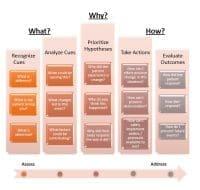During my 8 years as an RN, I’ve had the opportunity to precept several nurses and student nurses. After the students graduate and start their careers, I continue to connect with them to learn about their experiences. I often hear the same myths about expectations of being a nurse. Usually, new nurses compare their situation to these myths and feel like they are alone. But they need to know that they’re not alone. It’s time to address these myths and prepare nurses to have satisfying careers. Both new nurses and experienced nurses can benefit from understanding the realities behind the myths.
Myth 1: I am going to love nursing from day one on the unit. While I hope that this is the case for everyone, it’s not always the reality. Nursing school rigorously prepares us to be competent nurses. However, part of being a nurse is critical thinking and understanding the value of your role, which can take years to develop. I often hear from new nurses that they aren’t as happy as a nurse as they thought that they would be. The bedside is not what they expected. Many consider other careers or graduate school because they think that they are the only ones who feel this way, but that’s not the case.
During my first 2 years as a nurse, I often doubted why I chose this career path. My schooling had prepared me well, but there was an emotional aspect to the intensive care unit that wore on me over my first several months. I started looking into getting a MPH or MBA, something that would be totally different from the bedside.
I looked at the nurses on my unit that had been there for over 10 years in awe. How were they still satisfied? One nurse told me that it took her several years to realize the impact that she was making every day as a bedside nurse and be content. It wasn’t until after my 3rd year that I realized what she was talking about. During my first 2 years, I was so focused on learning and understanding what was going on with my patients that it wore me out. After my 3rd year, I became more comfortable with my skills and knowledge and realized that there is another level to nursing entirely. Everything that I do for my patients, be it fetching fresh water, emptying their commodes, passing medications, or listening to their stories, influences them in some way, hopefully leading them to recovery, better outcomes, or a more positive experience. My presence is vital and impacts every patient and person that I come in contact with.
It takes years to get to this point though, which can be quite frustrating for new nurses. Keep in mind that how you feel will typically get better. If after several years you find yourself complaining daily about your job and not enjoying or seeing the value of your work, it might be time to consider a change. The practice of nursing involves commitment to your patient, safety, unit, and your morals. Over years, this balance may become offset and a fresh start may be needed. Negativity on the unit can not only harm patients, it also hurts other staff members and can make the work environment harsh.
Myth 2: I am going to stay at my first job forever. There are myriad factors that influence how we get our first job. It could be based on location, environment, coworkers, management, unit, or wherever we can get a foot in the door. All hospitals, and really all units, are different. Units have various management styles, patient populations, staff members, and work schedules, all of which can influence our job satisfaction.
We go into our first job hoping that it will be a great fit and have an interesting patient population, with a supportive staff and management team. Yet, sometimes one of these factors hinders us from being happy on the unit. That is okay. You are not alone. It’s important to meet your contract requirements or expectations regarding commitment to the unit, but it’s also acceptable to look for another job once these criteria are met. Staying in any job long-term is as much about finding the right fit as it is about determining which factors are most important to you in your work environment. How many people buy the first wedding dress that they try on?
Myth 3: I am only going to work on one specific type of unit. The variety within nursing is unique to our profession. Some nurses start out on an orthopedic unit, then transition to intensive care, and maybe go to the emergency department after that. Once you master the basics of nursing, your skills are transferrable to other types of units. You might have to get additional training, but the ability to move between units is there.
Not only can you transfer to different units, you can also change from inpatient to outpatient; work in the operating room; lead research; teach; practice in infection prevention, hospice, or home health; or even transition to management. We change throughout our nursing career and so do our lives and goals. After you have a baby, you might decide you want to work in the neonatal intensive care unit. At another point, you might have young children and want a more regular schedule, so you change to an outpatient office setting. Maybe teaching is your passion, so you decide to become a clinical instructor. The options are unlimited and it’s ultimately up to you to decide what fits your lifestyle at the moment.
Myth 4: I have to go to graduate school to be happy. The younger generation of nurses often faced stiff competition to get into nursing school. This leads to highly driven and academic students, which creates great nurses. However, as driven people, we often feel that we have to continue on with graduate school to maintain our momentum and be successful. Nursing offers a variety of career paths within the field, all of which are wonderful opportunities to take care of patients in different ways. Yet, just because these options exist, does not mean that everyone needs to take advantage of them. You do not need to go to graduate school to be happy. There is nothing wrong with staying at the bedside as a frontline nurse.
On most units, many nurses have been there for decades and never thought twice about leaving. There are some major advantages to being a nurse, including scheduling flexibility, overtime opportunities, participating in unit-based committees and councils, and leaving your work at work when you go home. There is too much pressure on new nurses to get a little bit of experience and move on. Take some time to get used to being a nurse and appreciate the impact that you make. Then decide if graduate school is the right decision for you.
As someone who chose to go back to school after working at the bedside for several years, here is my best advice:
- Be absolutely sure that this is what you want to do. I’ve seen nurses who chose one career path to get halfway through a program and have to start over again to go a different route. You don’t want this to be you! Going to graduate school is a commitment, not only financially, but also with your time. Take time to shadow multiple times with different people in your perspective career path. If you have any doubts, consider waiting to apply to school or ask about deferment options. Keep in mind that there is no perfect time to go to school. Life will always find a way to stop you, so you ultimately need to make the decision to follow this path if this is the right choice for you.
- All jobs have pros and cons. While a career path may look enticing from the outside, spend time researching it and talking with professionals about their experiences. You might have to dig deeper to find the challenges facing your desired profession. No job is perfect.
- Research programs and choose to apply to ones that work for you. While it might be your dream to attend a school across the country, maybe you have a family with kids and that is not feasible. Talk to current students and graduates about their programs and hear about the good and the bad. No program is perfect, but it helps to know what you are getting into in advance.
- Apply to multiple programs and go from there. It costs money to apply, but it’s better to know all of your options when you make your final decision. You usually only go to graduate school once, so make sure it’s the right program for you.
I want to be clear that I did not leave frontline nursing because I did not enjoy working at the bedside. Instead, I found a specialty that encompasses some of my favorite aspects of being an intensive care nurse, making it a great fit for me.
Reaching out
Being a new nurse is challenging emotionally, clinically, and mentally. It’s easy to feel isolated from other new nurses who have had different experiences or a smoother transition. I want you to know that you are not alone. Reach out to experienced nurses on your unit to hear their thoughts. Talk to someone who has been out of nursing school for a few years and still remembers what it was like being new. Consider asking if someone can mentor you during your first year. It helps having a confidant you can express your feelings to regularly and privately, without repercussions.
For those of you who are experienced nurses, remember that as part of the nursing community, it’s our job to take care of our patients and each other. If we want to increase our unit retention, we all need to be an active part in mentoring our new nurses. They are ultimately the future of our profession. Part of supporting our staff is giving people the space to learn, but also helping them to grow into content, competent nurses. If they aren’t satisfied in their role as nurses, it’s challenging for them to take care of others.
Emily Matheson is a certified registered nurse anesthetist at the University of Washington Medical Center in Seattle, Washington. The views in this article are independent and do not represent the University of Washington Medical Center in any way.



















4 Comments.
Thank you for this article, it is motivating and eye-opening. I am 41, and currently in nursing school. I also work fulltime in a hospital, as a CNA. It’s challenging, but it’s doable. Thank you for mentoring.
Tracey-Ann, I am 39 and in nursing school! I agonized over the decision, but now that I’m in, I am doing it and excited. I have a family, so I knew it was going to require sacrifice on everyone’s parts, but now that we are in a groove, it’s working out just fine.
I appreciated this article and the practical tips communicated.
Great article. Worth the read. I am currently in nursing school. Tracey-Ann, you are not too old to become a nurse! Nursing does not discriminate against age. I am currently in school with people who are older than you. Age is just a number. If helping people is your passion, I say then go for it!
I read your article. I think it’s very encouraging; I’m interested in becoming a nurse and I know there are many challenges I’ll face but I’m determine. I’m 39 do you think I’m too old to pursue this career at this stage in my life.